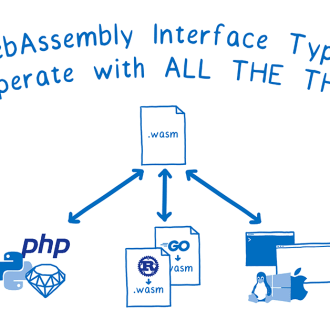The Best of Mozilla
10+ most popular Mozilla articles, as voted by our community.
Mozilla on Game Development
Progressive Web Games
Web game developer Andrzej Mazur explores the concept of Progressive Web Games. He describes howe to use PWA features built with Web APIs for modern game development. He introduces the ...
Mozilla on Mixed Reality
Explore the immersive web with Firefox Reality. Now available for Viveport, Oculus, and Daydream
Earlier this year, we shared that we are building a completely new browser called Firefox Reality. The mixed reality team at Mozilla set out to build a web browser that ...
Mozilla on Mozilla
Entering the Quantum Era—How Firefox got fast again and where it’s going to get faster
Over the past seven months, we’ve been rapidly replacing major parts of the engine, introducing Rust and parts of Servo to Firefox. Plus, we’ve had a browser performance strike force ...
A cartoon intro to DNS over HTTPS
At Mozilla, we closely track threats to users' privacy and security. This is why we've added tracking protection to Firefox and created the Facebook container extension. In today's cartoon intro, ...
Mozilla on Programming
Introducing the MDN Playground: Bring your code to life!
MDN is launching a code Playground. Users can prototype ideas and expand all live samples into an interactive experience.
Getting started with CSS container queries
CSS container queries are a powerful new tool for our CSS layout toolbox. In this post we'll dive into the practicalities of building a layout with container queries.
Mozilla on Python
Pyodide: Bringing the scientific Python stack to the browser
Pyodide is an experimental project from Mozilla to create a full Python data science stack that runs entirely in the browser. We think it’s worthwhile to work on moving the ...
Mozilla on Raspberry Pi
How to build your own private smart home with a Raspberry Pi and Mozilla’s Things Gateway
Last year we announced Project Things by Mozilla. Project Things is a framework of software and services that can bridge the communication gap between connected devices by giving things URLs ...
Mozilla on Ruby
WebAssembly Interface Types: Interoperate with All the Things!
People are excited about running WebAssembly outside the browser. People are also excited about running WebAssembly from languages like Python, Ruby, and Rust. Lin Clark's Code Cartoons are back,…
Mozilla on Smart Home
Privacy Included: Rethinking the Smart Home
A special edition from the Internet Health Report on rethinking the smart home.
Popular
These are some all-time favorites with Refind users.
Why are hyperlinks blue?
The internet has ingrained itself into every aspect of our lives, but there’s one aspect of the digital world that I bet you take for granted. Did you ev
«Culturally, we associate links with the color blue so much that in 2016, when Google changed its links to black, it created quite a disruption. »
Firefox Rolls Out Total Cookie Protection By Default To All Users
Take back your privacy Starting today, Firefox is rolling out Total Cookie Protection by default to all Firefox users worldwide, making Firefox the most pr
Improving Firefox responsiveness on macOS
If you're running Firefox on macOS you might have noticed that its responsiveness has improved significantly in version 103.
How to overcome distractions (and be more productive)
Nir Eyal, Pocket reader and author of two bestselling books, shares tips on how to become “indistractible.”
Creating custom easing effects in CSS animations using the linear() function
The new CSS linear() timing function enables custom easing in animations. Explore how linear() works compared with other timing functions used for easing, with practical examples.
What is Refind?
Every day Refind picks the most relevant links from around the web for you. is one of more than 10k sources we monitor.
How does Refind curate?
It’s a mix of human and algorithmic curation, following a number of steps:
- We monitor 10k+ sources and 1k+ thought leaders on hundreds of topics—publications, blogs, news sites, newsletters, Substack, Medium, Twitter, etc.
- In addition, our users save links from around the web using our Save buttons and our extensions.
- Our algorithm processes 100k+ new links every day and uses external signals to find the most relevant ones, focusing on timeless pieces.
- Our community of active users gets the most relevant links every day, tailored to their interests. They provide feedback via implicit and explicit signals: open, read, listen, share, mark as read, read later, «More/less like this», etc.
- Our algorithm uses these internal signals to refine the selection.
- In addition, we have expert curators who manually curate niche topics.
The result: lists of the best and most useful articles on hundreds of topics.
How does Refind detect «timeless» pieces?
We focus on pieces with long shelf-lives—not news. We determine «timelessness» via a number of metrics, for example, the consumption pattern of links over time.
How many sources does Refind monitor?
We monitor 10k+ content sources on hundreds of topics—publications, blogs, news sites, newsletters, Substack, Medium, Twitter, etc.
Can I submit a link?
Indirectly, by using Refind and saving links from outside (e.g., via our extensions).
How can I report a problem?
When you’re logged-in, you can flag any link via the «More» (...) menu. You can also report problems via email to hello@refind.com
Who uses Refind?
450k+ smart people start their day with Refind. To learn something new. To get inspired. To move forward. Our apps have a 4.9/5 rating.
Is Refind free?
Yes, it’s free!
How can I sign up?
Head over to our homepage and sign up by email or with your Twitter or Google account.














